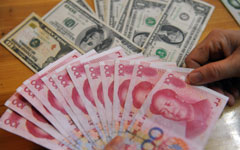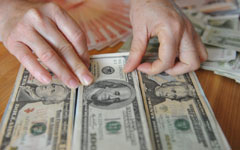The return of the renminbi rant
Updated: 2014-05-05 08:22
By Stephen S.Roach (China Daily)
|
|||||||||||
China's currency, the renminbi, has been weakening in recent months, resurrecting familiar charges of manipulation, competitive devaluation, and beggar-thy-neighbor mercantilism. In mid-April, the US Treasury expressed "particularly serious concerns" over this development, underscoring what has long been one of the most contentious economic-policy issues between the United States and China.
This is a timeworn debate - politically inspired and grounded in bad economics - that does a serious disservice to both sides by diverting attention from far more important issues affecting the US-China economic relationship. Taken to its extreme, America's accusations risk pushing the world's two largest economies down the slippery slope of trade frictions, protectionism, or something even worse.
 |
 |
Over the same period, there has been a dramatic adjustment of China's international balance-of-payments position. The current-account surplus - the most telling symptom of an undervalued currency - has narrowed from a record 10.1 percent of GDP in 2007 to just 2.1 percent in 2013. The International Monetary Fund's latest forecast suggests that the surplus will hold at around 2 percent of GDP in 2014.
Seen against this background, US officials' handwringing over the recent modest reversal in the renminbi's exchange rate appears absurd. With China's external position much closer to balance, there is good reason to argue that the renminbi, having appreciated by nearly one-third since mid-2005, is now within a reasonable proximity of "fair value." The IMF conceded as much in its latest in-depth review of the Chinese economy, which calls the renminbi "moderately undervalued" by 5-10 percent. This stands in contrast to its earlier assessments of "substantial" undervaluation.
America's fixation on the renminbi is a classic case of political denial. With US workers remaining under intense pressure in terms of both job security and real wages, politicians have understandably been put on the spot. In response, they have fixated on the Chinese component of a long-gaping trade deficit, charging that currency manipulation is the culprit to the long festering woes of the American middle class.
Related Stories
US Treasury declines to name China as currency manipulator 2014-04-16 07:54
US urged to 'understand' yuan issue 2014-04-17 08:46
RMB to be global reserve currency by 2030: Economist 2014-04-09 23:51
RMB internationalization could transform global markets 2014-03-26 13:21
Do not hype yuan fluctuation: MOC 2014-03-18 13:36
First trading day smooth with wider band 2014-03-18 09:28
Today's Top News
Deal signed to upgrade roads, grid in Ethiopia
Tokyo lawmakers begin China visit
Foreign spies busted in Guangdong
Iran test-fires air defense system
Yunnan's only panda perking up thanks to TV
Intl cooperation to aid drug fight
Senior Chongqing official investigated
Driver of overturned car linked to 2009 fatal wreck
Hot Topics
Lunar probe , China growth forecasts, Emission rules get tougher, China seen through 'colored lens', International board,
Editor's Picks

|

|

|

|

|

|





